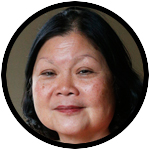
Carolyn Woo
The events in Charlottesville, Virginia, gave me many reasons for pause. The hatred spewed by people in white hoods with flaming torches jumped from the safety of books, movies or some isolated places to permeate the news in my home and puncture my perception that such sentiments are only on the fringe.
Until now, the Ku Klux Klan seemed far away enough from our lives, notwithstanding my warning to our sons never to go over the speed limits in towns where there are Klan activities.
I was further stunned by the president’s remarks that seemed to give cover for the people who screamed white supremacy, waved the Nazi flag and denounced Jews in chants. If that was not bad enough, I was appalled by the Jewish cabinet members who stood with blank faces and a Chinese cabinet member who smiled her approval.
Silence: How could these individuals say nothing? For a Jewish person to not immediately call “foul” after the experience of the Holocaust, or for a Chinese to not stand up for people of color is beyond reason.
[hotblock]
That is, of course, when we leave fear out of the equation. Why do we keep silent in the face of such plain and indefensible injustice and wrong? Some surmise that at least one of the officials aims for a more prestigious appointment.
Others may just want to keep what they have. There are those who may feel a sense of loyalty to their boss. Sometimes it is just pragmatic calculus that perhaps one could do more good or accomplish an agenda staying silent for the moment.
Raising one’s voice can put a marker that invites derision and attacks: There is a price to pay. For some, racism is not their problem: They are not the victims nor the perpetrators. It is someone else’s fight.
Whose fight is it anyway?
I have not always stood up to racism. I grew up in a culture that has honed “go along to get along” to a fine art with operating instructions to walk away from trouble, or work harder and “swallow bitterness” when one is treated unfairly.
During my early experience here as a foreign student, it seemed “safer” to let Chinese jokes, derogatory comments and discriminatory practices go unchallenged. I held back as I felt isolated, marginal, vulnerable, powerless and awkward.
All this changed the day when my 4-year-old son walked into a new classroom and a boy led a chant of “China-man.” I saw confusion, intimidation and hurt on his reddened face. In an instant, he had been singled out, made an outsider, rendered a “legitimate” object for mocking.
In the following years, particularly from my work at Catholic Relief Services, I have recognized the pernicious effects when individuals or groups are labeled as “the other.” Labels reflect and fortify attitudes, calcify differences into threats, dissolve the instincts of human decency, legitimize suppression and oppression, and eventually result in violence.
Keeping silent, whether we intend or not, indicates approval and makes us complicit. Then we are all diminished having lost the essence that defines our humanity.
Whose fight is it? The U.S. Conference of Catholic Bishops Ad Hoc Committee Against Racism made it a fight for all of us in the words of its chair, Bishop George V. Murry, who draws from the Gospel to clearly state that “racism is a sin.”
My conviction comes not only from the Gospel, but also from the actions by the generals as well as men and women who populated the peaceful protests with placards that proclaim unity and community. Their courage calls forth my own, and their passion reminds me of what we are fighting for: the peaceable kingdom of God here and now.
***
Woo is distinguished president’s fellow for global development at Purdue University and served as the CEO and president of Catholic Relief Services from 2012 to 2016.
PREVIOUS: The virtue of meekness is an antidote to the epidemic of anger
NEXT: Bringing the Eucharist and becoming the body of Christ



Share this story